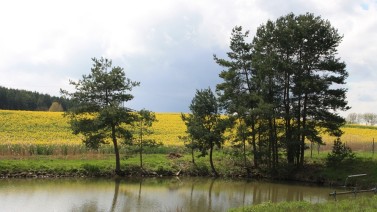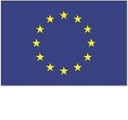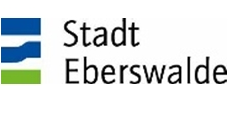Case study analysis SUFISA - Sustainable Finance for Sustainable Agriculture and Fisheries
| |
The rationale for Work Package 2 was to move beyond generalised CSP (conditions, strategies and performances) contextualization and to investigate the nature and complexity of market imperfections, policy requirements and their implications for specific commodity sectors and regions, thereby providing a more holistic regional and commodity-sensitive analysis of CSP. Adopting a regional perspective to capture variable context, the work for this workpackage was divided into six consecutive tasks, which move from region-specific to comparative cross-regional analysis.

Picture: Oilseed rape field and traditional carp pond in Franconia, © BLE Bonn
The German case study analyses focus on the examination of market, policy and other relevant impacts for the commodities of fish from aquaculture and oilseed rape. These analyses are practice-based and investigate farmers’ conditions, strategies and sustainability performances (CSP) on a regional and (if needed) on the national level. The case studies include the analysis of the drivers, conflicting interests and interplay between actors and/or institutions.
The selection of case studies was the first task of the SUFISA workpackage on practice cases (WP2). Jointly, SUFISA teams selected the following cases for Germany:
• A: Aquaculture production on the national level with a particular focus on traditional carp farming in Franconia. Trout farming in Baden and the potential of intensive fish production in circulation system are further aspects of this case study analysis.
• B: Oilseed rape cultivation for vegetable oil, bio-diesel and rape meal production - an areabased case study for the Wetterau in the Federal State of Hesse
Map: SUFISA casestudies of the partner countries
Media Analysis in Germany
The aim of the media analysis is to detect the different positions and approaches in the respective national media with regard to the overall objective of SUFISA: to identify practices and policies that support the sustainability of primary producers in a context of complex policy requirements, market imperfections and globalization. The analysis highlights four thematic fields that appear regularly in general media articles in the period 2012-2016: environmental and consumer protection, animal welfare, availability of agricultural production factors, agricultural policy and markets for farm products. The key issues discussed are the price crisis (mainly in the dairy sector), factory farming (in the context of animal welfare), food safety (e.g.mislabelling), the reform of the Common Agricultural Policy ('Greening'), the regulation of organic farming, free-trade-agreements (mainly TTIP, CETA), the diversity of seeds (legal restrictions), land shortage (rising land prices), green gene technology, and the banning of glyphosate. The media coverage illustrates the interrelations between the protection of consumers, environment and animals, and the difficult economic situation of farmers. Sustainability issues in relation to agricultural production are also discussed. The positions differ significantly between the professional media and the pulic media.
Next page: Impact evaluation of market imperfections and relevant policy measures
This project has received funding from the European Union's Horizon 2020 research and innovation programme under grant agreement No 635577.
Responsibility for the information and views set out on this website lies entirely with the authors.











